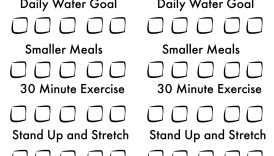The Game of Healthy Living: Are You Up for the Challenge?

Importance of Healthy Living
In today’s fast-paced world, the importance of healthy living cannot be overstated. A well-balanced lifestyle is more than just eating the right foods; it encompasses mental well-being, physical activity, and social connections. By prioritizing health, individuals can improve their quality of life and enjoy increased energy levels, better moods, and enhanced cognitive function. For instance, a friend of mine who decided to focus on his health noticed remarkable changes in just a few months—he had more stamina, slept better, and felt more positive overall.
- The Game of Healthy Living: Are You Up for the Challenge?
- Importance of Healthy Living
- Benefits of Taking on the Challenge
- Setting Goals for Healthy Living
- Understanding Your Body
- Creating Realistic Health Goals
- Nutrition for Optimal Health
- Balancing Macronutrients
- Incorporating Superfoods in Your Diet
- Staying Active and Fit
- Importance of Regular Exercise
- Finding Physical Activities You Enjoy
- Mental Health and Well-Being
- Managing Stress
- Prioritizing Self-Care
- Building a Support System
- Surrounding Yourself with Positive Influences
- Seeking Professional Guidance
- Overcoming Challenges and Setbacks
- Strategies for Maintaining Motivation
- Learning from Mistakes
- Tracking Progress and Celebrating Success
- Importance of Monitoring Your Health
- Rewarding Yourself for Achievements
Benefits of Taking on the Challenge
Taking on the challenge of healthy living opens up a pathway filled with countless rewards. Here are some key benefits to consider:
- Improved Health: Lower risk of chronic diseases such as diabetes and heart disease.
- Enhanced Mood: Regular exercise and healthy eating can significantly improve mental health.
- Increased Energy: A balanced diet combined with physical activity leads to better energy management throughout the day.
- Weight Management: Healthy living practices aid in maintaining a healthy weight and body image.
Embracing a healthy lifestyle not only enhances personal well-being but also creates a positive ripple effect that influences family, friends, and the broader community. In the following sections, we will explore how to set achievable goals for healthy living.
Setting Goals for Healthy Living
Understanding Your Body
Understanding your body is the first step to setting effective health goals. Each person is unique, equipped with distinct needs and capabilities. Take the time to assess your current health status, including factors like fitness level, dietary habits, and any underlying health conditions. For example, when Laura noticed she often felt tired after her morning jogs, she realized her diet lacking in protein wasn’t supporting her energy levels. To better understand your body, consider:
- Keeping a Health Journal: Track what you eat, your exercise routine, and how you feel physically and mentally.
- Consulting a Health Professional: A physician or nutritionist can provide tailored advice on your body’s specific requirements.
Creating Realistic Health Goals
Once you understand your body, it becomes easier to create realistic health goals. Setting achievable goals can help maintain motivation and foster a sense of accomplishment. Here are some tips for crafting those goals:
- Be Specific: Instead of saying, “I want to eat better,” specify, “I will include a salad in my lunch three days a week.”
- Measurable and Time-bound: Goals like “I will run a 5K in three months” give you a clear deadline to work towards.
- Start Small: Begin with minor adjustments that can build momentum to larger changes.
Remember, the journey to healthy living is a marathon, not a sprint. Embrace each step, and you’ll find success on the horizon.
Nutrition for Optimal Health
Balancing Macronutrients
Once you’ve set your health goals, the next step is focusing on nutrition for optimal health. One crucial aspect is balancing macronutrients: carbohydrates, proteins, and fats. Each plays a vital role in overall well-being. For example, when Mark wanted to boost his workouts, he learned that incorporating an adequate amount of protein helped build muscle and recovery time. Here’s a simple breakdown of macronutrient roles:
- Carbohydrates: Provide energy for daily activities and workouts.
- Proteins: Essential for muscle repair and growth; ideal sources include chicken, beans, and dairy.
- Fats: Necessary for brain health and hormone production; choose healthy fats like avocados and olive oil.
Incorporating Superfoods in Your Diet
An exciting way to enhance nutrition is by incorporating superfoods into your meals. These nutrient-dense foods offer exceptional health benefits and can easily be added to everyday meals. For instance, Sarah began adding blueberries to her morning oatmeal, which not only tasted delicious but also packed a punch of antioxidants. Some superfoods to consider:
- Quinoa: A complete protein grain that is gluten-free.
- Kale: High in vitamins A, C, and K.
- Chia Seeds: Loaded with omega-3 fatty acids and fiber.
Combining balanced macronutrients with superfoods can pave the way for sustained energy and health in your journey towards optimal well-being.
Staying Active and Fit
Importance of Regular Exercise
As you nourish your body with a balanced diet and superfoods, incorporating regular exercise becomes essential for maintaining optimal health. Exercise not only enhances physical fitness but also plays a crucial role in boosting mental well-being. For instance, when Jenna started her morning walks, she quickly discovered that her mood improved significantly throughout the day. Including a mix of aerobic, strength, and flexibility training can lead to numerous benefits:
- Improved Cardiovascular Health: Regular workouts strengthen the heart and improve circulation.
- Enhanced Mood: Physical activity releases endorphins, often referred to as the “feel-good” hormones.
- Weight Management: Helping to burn calories and maintain a healthy weight.
Finding Physical Activities You Enjoy
The key to sticking with a fitness routine is finding activities you genuinely enjoy. If the gym feels more like a chore than a pleasure, explore other options! When Mike turned to dancing, he not only got a workout but also found a fun way to socialize. Here are some enjoyable physical activities to consider:
- Swimming: Low-impact exercise that’s easy on the joints.
- Group Classes: Dance, yoga, or cycling classes can add excitement to your routine.
- Outdoor Activities: Hiking, biking, or playing sports can be both refreshing and invigorating.
By engaging in activities you love, exercise transitions from a duty to a rewarding part of your daily life, making it easier to stay active and fit.
Mental Health and Well-Being
Managing Stress
As important as physical fitness is, mental health and well-being should not be overlooked. In today’s fast-paced world, stress is often a constant companion. Recognizing how to manage stress effectively can lead to a healthier mindset. For example, when Tom began practicing mindfulness meditation, he noticed a significant reduction in anxiety levels and an increase in focus throughout his day. Here are some effective stress management techniques to consider:
- Deep Breathing Exercises: Simple and can be done anywhere, these help calm the mind.
- Time Management: Prioritizing tasks can prevent feelings of overwhelm.
- Physical Activity: Exercise is a known stress reliever that releases endorphins.
Prioritizing Self-Care
Incorporating self-care into your routine is essential for maintaining mental well-being. Self-care isn’t just about pampering yourself; it’s about nurturing your body and mind. For instance, Lisa scheduled “me time” every Sunday, where she indulged in reading and relaxing baths, leading her to feel recharged for the week ahead. To prioritize self-care, consider these activities:
- Establishing a Routine: A structured day can foster a sense of control.
- Pursuing Hobbies: Engaging in activities that bring joy can be incredibly therapeutic.
- Connecting with Others: Spending time with loved ones can uplift your spirits.
By effectively managing stress and prioritizing self-care, individuals can foster a more balanced and fulfilling life.
Building a Support System
Surrounding Yourself with Positive Influences
As you embark on your journey toward healthier living, building a support system is crucial. One of the simplest yet most effective ways to stay motivated is by surrounding yourself with positive influences. For instance, when Emma decided to adopt a healthier lifestyle, she joined a local running club. The encouragement from fellow members kept her motivated, making those early morning runs less daunting. Consider these ways to cultivate a supportive network:
- Connect with Like-minded Individuals: Join groups or classes that reflect your interests, such as fitness workshops or healthy cooking classes.
- Engage with Family and Friends: Share your goals with them, so they can provide encouragement and hold you accountable.
- Limit Exposure to Negativity: Identify and distance yourself from people who may discourage your health journey.
Seeking Professional Guidance
In addition to surrounding yourself with positivity, seeking professional guidance can provide invaluable support. A health coach, nutritionist, or therapist can offer personalized advice and strategies tailored to your specific circumstances. When Mike sought the help of a personal trainer, he gained crucial techniques not just for exercise but also for setting realistic, healthy goals. Here are some benefits of professional guidance:
- Expert Knowledge: Professionals can provide insights based on years of training and experience.
- Accountability: Regular check-ins help you stay committed to your goals.
- Tailored Advice: Personalized strategies ensure you’re on the right track.
Building a solid support system is a foundational step on your path to a healthier lifestyle. Embrace the connections and expertise available to you, and watch your journey flourish.
Overcoming Challenges and Setbacks
Strategies for Maintaining Motivation
Even on the healthiest of journeys, challenges and setbacks are inevitable. It’s how you respond to these hurdles that can make all the difference. To maintain motivation, consider implementing a few effective strategies. For instance, when Rachel faced a plateau in her weight loss journey, she realized her workouts needed a refresh. By incorporating new classes and activities, she reignited her passion for fitness. Here are some strategies to keep your motivation alive:
- Set Short-term Goals: Celebrating small victories along the way fosters a sense of accomplishment.
- Track Your Progress: Keeping a journal or using fitness apps helps visualize progress.
- Reward Yourself: Treat yourself with non-food rewards, like a new outfit or a spa day, when you achieve a goal.
Learning from Mistakes
Along the way, mistakes are part of the process. Instead of allowing them to derail progress, view them as valuable learning opportunities. When James missed a workout routine due to a busy schedule, he took it as a chance to reassess his time management. To effectively learn from your setbacks:
- Reflect on What Happened: Analyze the situation and identify what you can do differently next time.
- Stay Positive: Remember, progress isn’t linear. Everyone experiences ups and downs.
- Seek Feedback: Discuss challenges with your support system for insights and encouragement.
Embracing both challenges and lessons learned can transform your health journey into a more resilient and rewarding experience.
Tracking Progress and Celebrating Success
Importance of Monitoring Your Health
As you move forward in your health journey, tracking your progress becomes essential. Monitoring various aspects of your health provides invaluable insight into what’s working and what might need adjustment. For instance, when Sarah began tracking her daily water intake and exercise routines, she quickly discovered patterns that helped her optimize her weight loss efforts. Here are a few effective methods for monitoring your health:
- Use Fitness Apps: Many apps allow you to log meals, exercise, and even mood, making it easier to identify trends.
- Keep a Health Journal: Documenting your thoughts and feelings can be a rewarding way to assess both physical and emotional progress.
- Regular Health Check-ups: Routine visits to your healthcare provider can help monitor broader health goals, such as blood pressure or cholesterol levels.
Rewarding Yourself for Achievements
Acknowledging your achievements is equally important. Celebrating milestones can boost motivation and reinforce positive habits. For example, when Tom hit his goal weight, he treated himself to a weekend getaway as a way to celebrate his hard work. Consider these ideas for rewarding your achievements:
- Non-food Rewards: Buy a new workout outfit, enjoy a spa day, or experience a new class.
- Plan an Outing: Organize a special day with friends or family to celebrate your success together.
- Set New Challenges: Use your successes as a springboard to establish new goals and continue the momentum.
By tracking your progress and celebrating your successes, you create a cycle of motivation that propels you further along your path to health and wellness.





